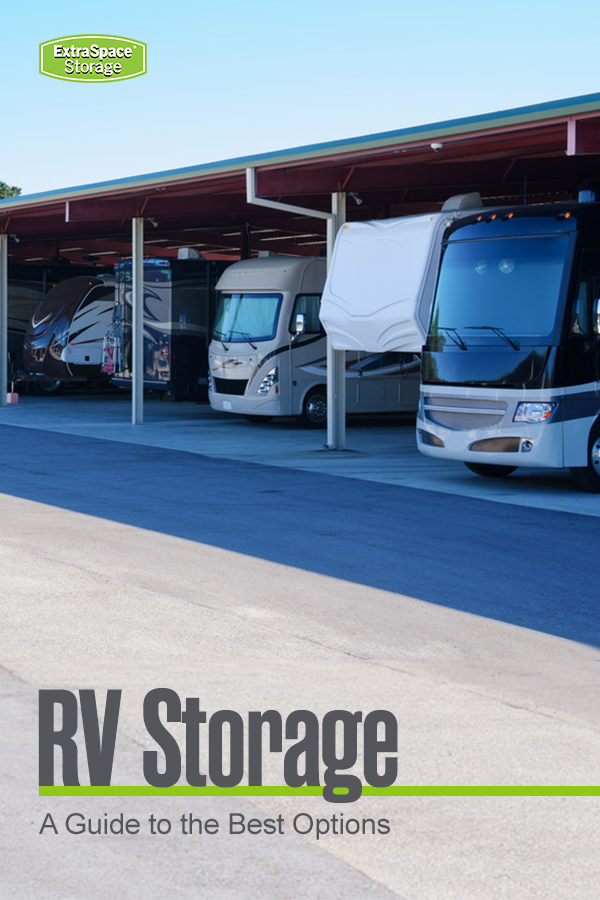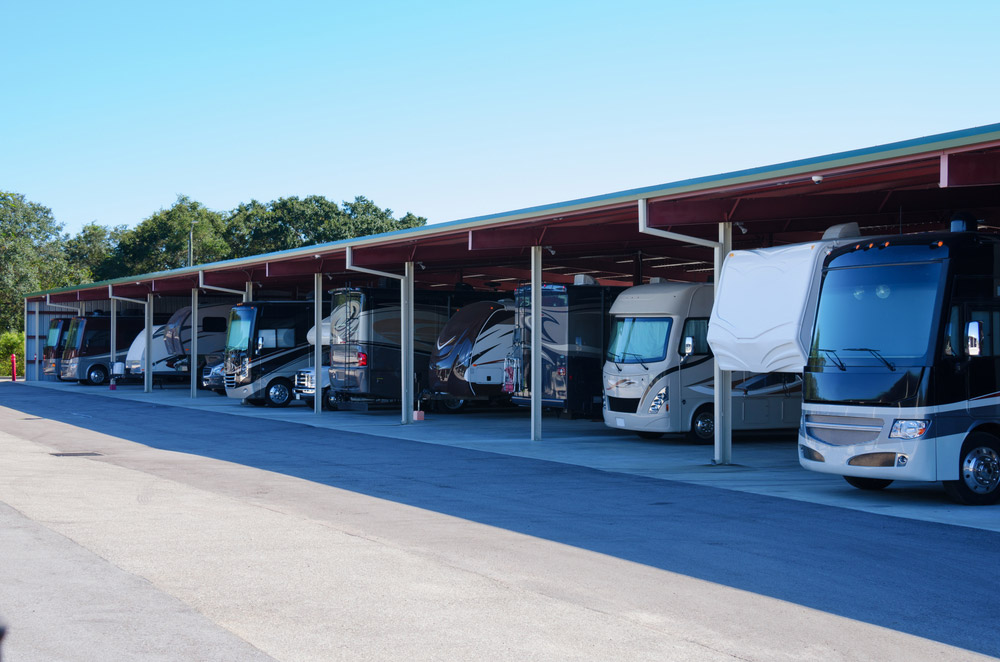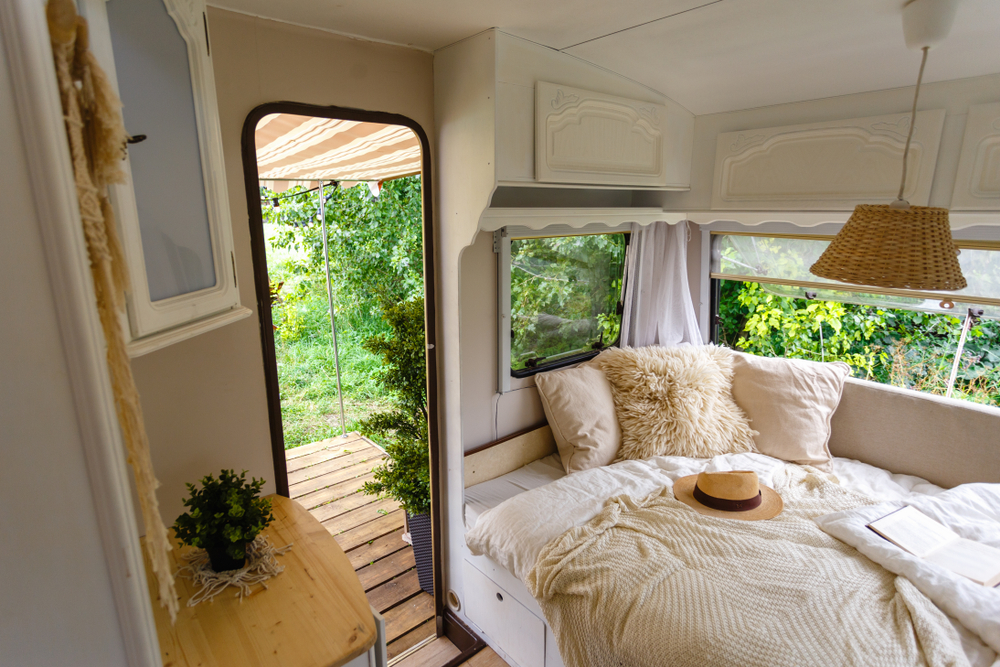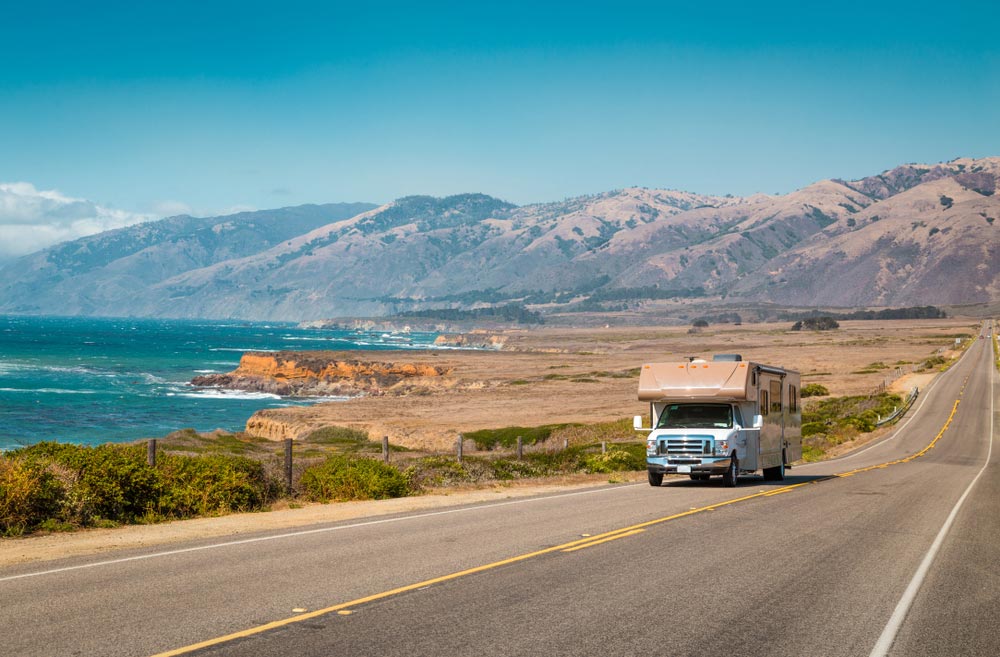When you’re not traveling, it’s important to find a secure place to store your RV, camper, or trailer. But you also need a storage solution that’s easy to access and that won’t cost you a fortune. To help, we’ve put together a vehicle storage guide detailing some of the best RV storage options available. Learn more about the advantages and disadvantages of each option below!
Storing an RV at Home
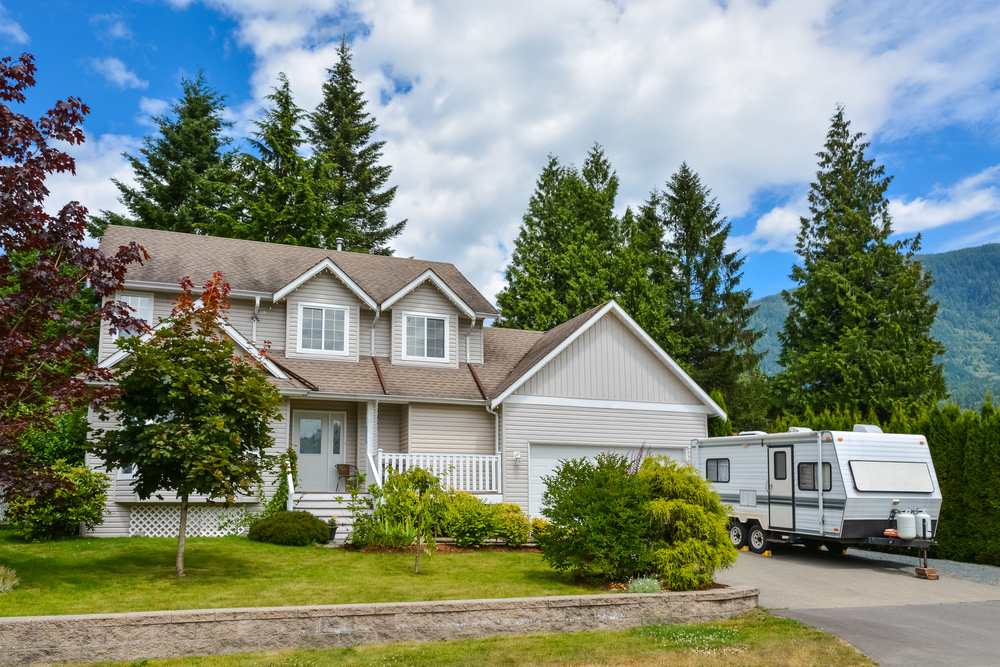
Keeping a recreational vehicle at home is common for many RV owners, as most trailers, pop-up campers, and small motorhomes can fit in a garage or driveway. However, storing at home comes with challenges.
Driveway
An easy place to store an RV or trailer at home is in your driveway. The average driveway is large enough for at least one car. But using your driveway as storage for an RV can create other problems.
Advantages
- Convenience: No waiting, picking up, or dropping off your RV is necessary. Take it when you need it.
- Cost: It’s your driveway, which means it doesn’t cost you anything to store here!
Disadvantages
- HOA Restrictions: Depending on where you live, your homeowners association may have rules against keeping an RV, trailer, or camper in your driveway. This could result in expensive fines or towing.
- Weather: Keeping your RV or trailer in your driveway means it’s more susceptible to damage caused by the sun, wind, rain, and snow.
- Space: If you own more than one vehicle, parking spaces are limited in your own driveway.
- Security: Your RV is more likely to get vandalized or stolen out in the open.
Garage
With a two-car garage, you may have space available to be used for storage for RVs, campers, or trailers. This is the perfect option for most class B and C motorhomes, which can be anywhere from 22 feet to 35 feet in length. Keep in mind not every garage can fit a recreational vehicle, especially if it’s a taller RV.
Advantages
- Cost: If your home has a garage large enough, you don’t have to pay to store your RV.
- Security: By keeping your RV in your garage, you greatly reduce the possibility of vandalism or theft.
- Weather: Environmental damage isn’t an issue when your vehicle is stored in an enclosed space.
Disadvantages
- Space: If you have a small garage and more than one car, one of your vehicles will have to sit outside. In addition, you may not have extra room inside your garage for home storage, an overflow fridge, an overflow freezer, and lawn equipment.
Backyard
Keeping a camper, RV, or trailer in your backyard can be a convenient option if you have enough space. Unfortunately, there are several downsides to utilizing your home’s yard to store your recreational vehicle.
Advantages
- Cost: If the plan is to simply park the RV in your yard, this option wouldn’t cost you anything.
- Convenience: Take your RV or trailer whenever you need it. You won’t have to worry about picking it up or dropping it off at a different location.
Disadvantages
- Cost: If you plan on building a parking pad, grading your yard, or adding a carport to accommodate your RV, the associated costs will increase immensely.
- HOA Restrictions: Many homeowners associations have rules in place that don’t allow vehicles to be kept in yards. Be sure to check with your neighborhood HOA before using your yard as your RV parking space.
- Weather: Without a roof, your vehicle will be exposed to the elements.
- Security: Any time you leave your RV out in the open, it’s at risk of vandalism or theft.
RV Garage
Constructing a specific RV garage is a popular choice among recreational vehicle owners. Especially if you’re building a custom home, this is a great option. However, this can be tricky for existing properties.
Advantages
- Convenience: RV garages can be designed to fit every motorhome and trailer size, including class A, class B, and class C.
- Weather: Indoor vehicle storage means your RV is protected from the elements.
- Security: Keeping your vehicle inside means the chances of damage and theft are significantly lower.
- Cost: When buying a home with an RV garage attached, the cost of the garage is already built in as part of the home’s overall cost.
Disadvantages
- Cost: The downside for homeowners looking to add an RV garage is that you would need to build onto an existing garage or a brand new structure.
- Space: Adding onto an existing garage can take up valuable real estate around your home, which could turn future buyers away.
Widened Driveway
If adding an extra carport to your garage isn’t an option, consider widening your driveway or adding a space that wraps to the side of your home to create storage for an RV. Unfortunately, this comes with unique challenges.
Advantages
- Convenience: Never worry about when you’ll be able to get your RV or if you can leave at a moment’s notice.
- Space: Other vehicles can keep their parking spaces in the garage or driveway.
Disadvantages
- City: If your city only allows covered structures in backyards, you could be out of luck.
- Cost: Depending on your plans, widening a driveway with concrete can cost between $900 and $3,000 for a 12×25 driveway.
- Security: Leaving your RV outdoors makes it accessible to pests and potential vandals or thieves.
- Weather: Without a covered carport, your RV will be exposed to the climate in which you live. That means you may have to worry about damage caused by ice, snow, rain, heat, humidity, etc.
Storing an RV at a Self Storage Facility
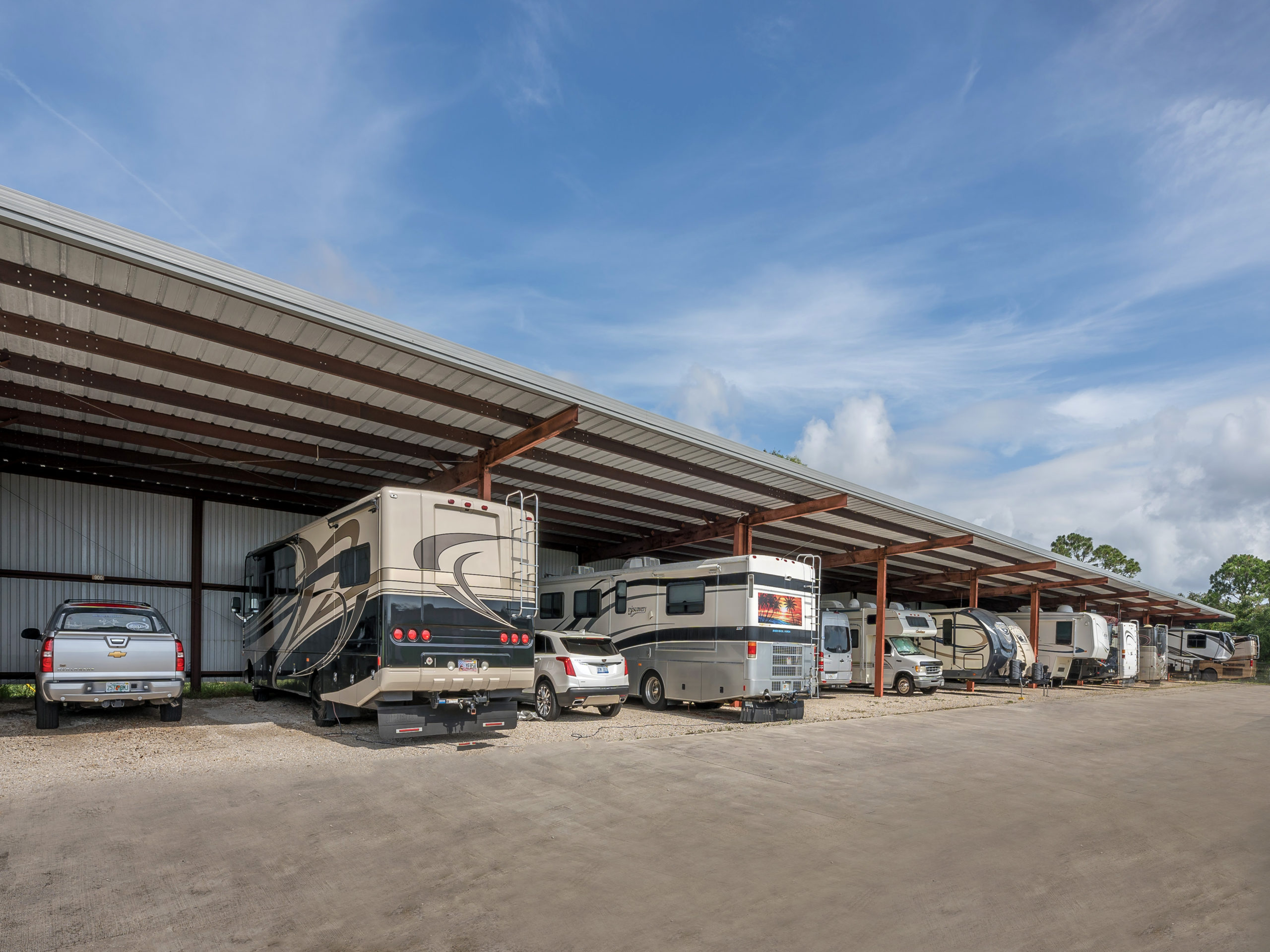
Maybe storing your RV at home isn’t in the cards, and that’s okay! Storage facilities across the country offer convenient RV storage options that provide great benefits, including security and affordability. How much does RV storage cost? Well, that depends on the type of RV storage you rent!
Outdoor RV Storage
Outdoor vehicle storage provides plenty of space for all types of RVs, trailers, and campers. This is most common self storage option for RVs, as it’s widely available and affordable.
Advantages
- Size: Outdoor RV storage offers the widest range of options for vehicles of all sizes. Spaces can hold everything from class A motorhomes to small pop-up campers and tow trailers.
- Cost: Overall, outdoor storage is generally the least expensive storage option offered.
- Security: Storage facilities that provide outdoor vehicle storage are often equipped with security features like high fences, keypad entry gates, and video surveillance.
Disadvantages
- Weather: Similar to parking in a driveway, outdoor RV and trailer storage leaves your vehicle exposed to the elements.
Covered RV Storage
A preferred option among RV owners is covered RV storage. Covered parking spaces provide some protection from the elements and, in some cases, cost about the same as uncovered options.
Advantages
- Size: Facilities that offer covered outdoor storage can fit almost all RV and trailer sizes.
- Cost: Covered RV storage is usually cheaper than renting an indoor vehicle storage unit.
- Security: Storage facilities with covered storage options for RVs typically have security features like video surveillance, high fences, and keypad entry gates.
- Weather: With a covered structure, your RV or trailer is better protected from the elements.
Disadvantages
- Weather: While covered storage areas provide shade, some elements won’t be stopped by a roof. Strong winds, extreme heat, humidity, and extreme cold can all still be issues for your vehicle.
Indoor RV Storage
One of the best solutions for long-term RV storage or winter RV storage is an indoor storage space. Indoor RV storage units can be more costly, but they provide the ultimate protection for your recreational vehicle.
Advantages
- Security: Indoor storage provides the best security. Not only will the storage facility have security features to provide a layer of protection, but you’ll also have an enclosed space with a unit lock.
- Weather: Keeping your RV or trailer in an indoor storage unit means you won’t have to worry about the elements. In fact, you may even find some facilities that offer climate-controlled vehicle storage.
Disadvantages
- Cost: Indoor RV storage is often the most expensive option available, especially if you choose a climate-controlled option.
- Size: Depending on the storage facility, you may not be able to find an indoor storage space large enough for your motorhome or trailer.
Frequently Asked Questions About RV Storage
How do you store an RV long term?
When storing an RV long term, you’ll want to invest in reliable storage that helps protect your vehicle from weather or temperature-related damage. In addition, you’ll need to winterize your RV by shutting down appliances, emptying your vehicle’s tanks, closing windows and vents, and cleaning the RV thoroughly.
Where can I find covered RV storage near me?
Extra Space Storage offers RV owners a variety of options for secure vehicle storage at conveniently located self storage facilities across the country. Find covered RV storage near you!
How much does RV storage cost?
The cost of RV storage depends on several factors, including location, how big of a storage space you rent, and what type of RV storage you need. If you need RV storage near you, contact Extra Space Storage today to learn more about available options!
***
If you choose to store your RV, camper, or trailer at a self storage facility, Extra Space Storage is the partner for you! We have convenient vehicle storage locations across the country. Find RV storage near you!
